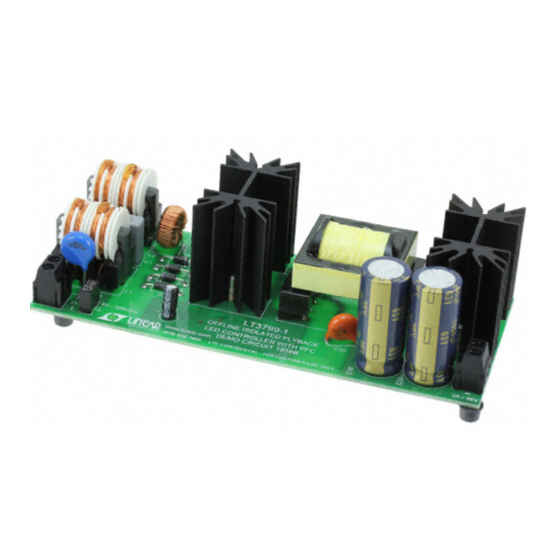Advertisement
Quick Links
Description
Demonstration circuit 1816B is an off-line isolated flyback
LED driver featuring LT
3799-1. The demo board provides
®
a single constant current output of 3A over an LED string
voltage from 22V to 38V. It is optimized to operate over
a wide AC input voltage range (90VAC to 305VAC, 47Hz
to 63Hz). LED current typically stays within ±5% over the
whole input voltage range. It provides a high power factor
(>0.9) enabling a single design to be used worldwide. It
is also designed to comply with the IEC 61000-3-2 Class
C harmonics standard and the EN55015B conducted EMI
standard.
The LT3799-1 controls an isolated flyback converter in
boundary mode. Its novel current sensing scheme deliv-
ers a well-regulated output current to the secondary side
performance summary
PARAMETER
Input Voltage Range
Output Current I
OUT
Output Voltage
Open LED Voltage
Note 1: For applications with low LED string voltage, FB pin divider resistor R4 and output clamp Z3 can be adjusted to reduce the open voltage limit.
See "Protection from Open LED and Shorted LED Faults" section in the data sheet for detail.
Offline Isolated Flyback LED
(T
= 25°C)
A
CONDITIONS
Line Frequency, 47Hz to 63Hz
V
= 120VAC, V
= 36V
IN
LED
(Note 1)
DEMO MANUAL DC1816B
Driver with PFC
without using an opto-coupler. Open- and shorted-LED
protection ensures long term reliability.
The LT3799-1 is available in a low profile, thermally-
enhanced 16-lead MSOP package.
The LT3799-1 data sheet gives a complete description
of the device, operation and application information. The
data sheet must be read in conjunction with this quick
start guide for demo circuit 1816B.
Design files for this circuit board are available at
http://www.linear.com/demo
L, LT, LTC, LTM, Linear Technology and the Linear logo are registered trademarks of Linear
Technology Corporation. All other trademarks are the property of their respective owners.
MIN
90
22
45
LT3799-1
TYP
MAX
UNITS
277
305
VAC
3
A
36
38
V
V
dc1816bfc
1
Advertisement

Summary of Contents for Linear Technology DC1816B
- Page 1 The LT3799-1 controls an isolated flyback converter in L, LT, LTC, LTM, Linear Technology and the Linear logo are registered trademarks of Linear boundary mode. Its novel current sensing scheme deliv- Technology Corporation. All other trademarks are the property of their respective owners.
-
Page 2: Quick Start Procedure
NOTE. Make sure that the input voltage does not exceed AND EVEN LIFE-THREATENING INJURIES. CONTACT the maximum input voltage (305VAC). LINEAR TECHNOLOGY APPLICATIONS ENGINEERS FOR PROPER COMPONENT REPLACEMENT. 4. Check for the proper output current. Demonstration circuit 1816B is easy to set up to evalu- Once the proper output currents are established, adjust the ate the performance of the LT3799-1. - Page 3 DEMO MANUAL DC1816B Quick start proceDure 1.00 0.98 0.96 0.94 0.92 0.90 110 130 150 170 190 210 230 250 270 290 110 130 150 170 190 210 230 250 270 290 305 90 110 130 150 170 190 210 230 250 270 290...
- Page 4 DEMO MANUAL DC1816B Quick start proceDure Output Voltage and Switch Node Voltage During Output Open IC V IC V 20V/DIV 20V/DIV 20V/DIV 20V/DIV 200V/DIV 200V/DIV 500ms/DIV DC1816B F09 500ms/DIV DC1816B F10 Figure 10. V = 277VAC Figure 9. V = 120VAC...
-
Page 5: Parts List
DEMO MANUAL DC1816B parts List ITEM REFERENCE PART DESCRIPTION MANUFACTURER/PART NUMBER Required Circuit Components CAP, 0.47µF 20% 310V POLYPROPYLENE VISHAY BFC33820474 CAP, 0.47µF 20% 450V FILM RUBYCON 450MMK474K CAP, 22µF 20% 35V ALUM NIC NRSZ220M35V5X11F CAP, 0603 10nF 10% 50V X7R AVX 06035C103KAT2A CAP, 0603 0.1µF 10% 50V X7R... - Page 6 DEMO MANUAL DC1816B parts List ITEM REFERENCE PART DESCRIPTION MANUFACTURER/PART NUMBER Additional Demo Board Circuit Components CAP, 1206 100pF 5% 1000V U2J MURATA GRM31A7U3A101JW31D DIODE, ULTRA FAST RECOVERY SILICON RECTIFIER CENTRAL SEMI. CMR1U-10M RES, 1206 10k 1% 1/2W VISHAY CRCW120610K0JNEAHP RES, 0603 Hardware—For Demo Board Only...
-
Page 7: Schematic Diagram
Information furnished by Linear Technology Corporation is believed to be accurate and reliable. However, no responsibility is assumed for its use. Linear Technology Corporation makes no representa- tion that the interconnection of its circuits as described herein will not infringe on existing patent rights. - Page 8 Linear Technology Corporation (LTC) provides the enclosed product(s) under the following AS IS conditions: This demonstration board (DEMO BOARD) kit being sold or provided by Linear Technology is intended for use for ENGINEERING DEVELOPMENT OR EVALUATION PURPOSES ONLY and is not provided by LTC for commercial use. As such, the DEMO BOARD herein may not be complete in terms of required design-, marketing-, and/or manufacturing-related protective considerations, including but not limited to product safety measures typically found in finished commercial goods.
- Page 9 X-ON Electronics Largest Supplier of Electrical and Electronic Components Click to view similar products for category: LED Lighting Development Tools Click to view products by manufacturer: Analog Devices Other Similar products are found below : MIC2870YFT EV 1278.1010 ADP1660CB-EVALZ ADP8860DBCP-EVALZ AS1119-DB HV9919BDB1 LM2796TLEV LM3404MREVAL LP55231SQEVM ADM8843EB-EVALZ ADM8845EB-EVALZ ADP8861DBCB-EVALZ TDGL014 MIC2873YCS-EV ISL97682IRTZEVALZ UCC25710EVM-654 LM3508TLEV LM3549SQEV/NOPB LP3943ISQEV EA6358NH TPS61158EVM-565 TPS61187EVM-528 TLC5929EVM-118 ZLED7020Kit-D1 V2.0 XRP7613EVB MAX16836EVKIT MAX16834EVKIT+...












Need help?
Do you have a question about the DC1816B and is the answer not in the manual?
Questions and answers